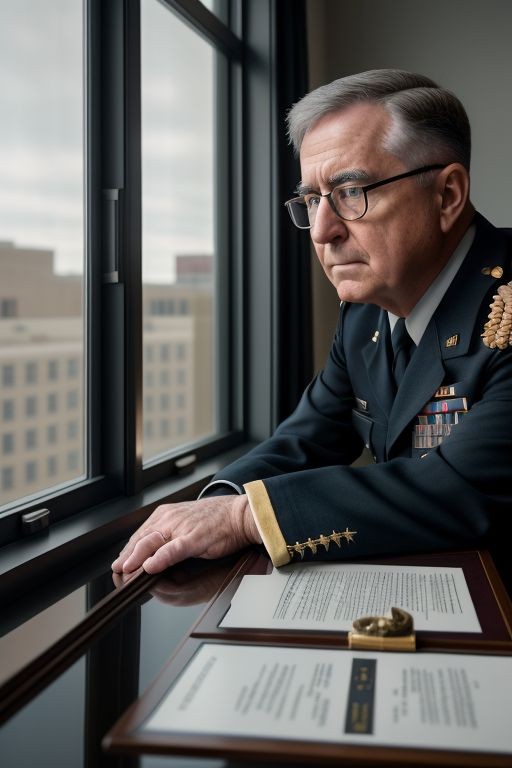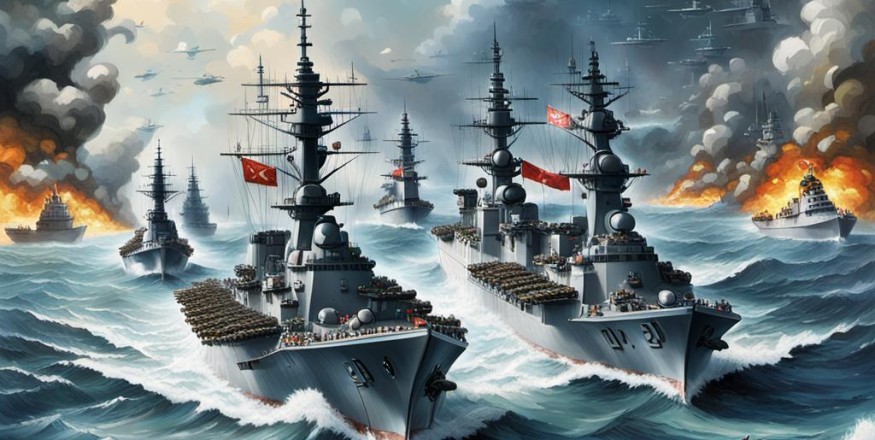 x
x
Bull Binghamton stared in fascination at the bird hopping along the branch outside his office window. He grinned to himself when he realized that he'd turned from his desk because some goddamn bird was making a racket outside, ruining his concentration. But what amused him was the fact that the bird was hopping about on that Iimb quite comfortably on one leg! It was most businesslike in its approach to whatever it was doing, apparently oblivious to the fact that it had only one leg left.
He wheeled himself over to his office door and turned the lock. The Admiral wasn't about to have anyone wandering in at a time like this. Back at the window, he searched in vain for his little bird. It was the only audience he would have permitted, now that he'd made up his mind. Locking the wheels of the chair, he placed his hands on the arms and pushed up until he was in a standing position. That was something he'd done before for his wife---Tess had encouraged him to take a step, and offered her arm, but he was the kind of man who would first have to do it himself. He promised that when he tried, she would be the first to know about it.
He searched the tree for his little friend, for some moral support, but the bird was gone. The muscles tensed in his right leg as he attempted to lift it. Nothing. Very slowly, he slid the foot along the floor....two inches.....four....six....and placed it firmly. Then he brought the left one along beside it in the same manner. Again he followed the same process, and again it was successful! Not bad, not bat. His legs were weak, no doubt about that. But he wasn't going off on a hike. The next steps brought him to the windowsill, and he leaned against it thankfully.
He relaxed for a while looking out on the Potomac. It had been some time since he'd seen it from this vantage point. It gave one a different perspective. He fervently wished that tough little bird had been around to urge him along. Very slowly, using the sill for balance, he turned and took the same shuffling steps back to the chair. Sitting was something else again. He leaned forward until he had a good grip on the arms, then lowered and twisted his body at the same time until he was once again seated.
It'd been exhausting. One more step and I might have been flat on my face, he mused. But my legs are coming back to me! I told them to. Tess would be the first one he'd show---that night. Then he might tell a few others because it was something big. This would kill any arguments that it was time for Bull Binghamton to retire!
He knew, and his doctors agreed, that the problem was linked to his mind. There was no evidence of permanent physical damage. It had been a sharp blow to the head---a tremendous shock---that had left him that way, and Binghamton believed that one day he would overcome his problem. It could be that the injury and the loss of two great ships in one day created a psychological block. Others understood, those close to him like Waverly and Locke, and they each gave him all the time he needed. Bull Binghamton was ready to return that faith---in spades!
Binghamton had been analyzing the Caribbean situation for days. His intelligence network, with several small contributions from Waverly and Locke, added to the picture he was developing. But it had been taking time, more time than usual, enough so that Bull Binghamton even hesitated at proclaiming his genius at this kind of thing. Now that his injury forced him to direct strategy from an office rather than from a flag plot on a ship there were days when he did question himself. Yet he had no doubt it could be done. It was just a bit harder to come to him this time. Over the years Washington had placed so much emphasis on Europe, the Middle East, and Japan, three years in Korea, Twelve years in Vietnam, and nearly twenty years in Afghanistan and Iraq, that it was hard to take a Caribbean crisis as seriously, to accept what Beijing might have in mind.
Now, the digital maps on his screen took on a new meaning. Once again, his mind perceived far more than what was visible. Ocean surfaces, landmasses, and islands were transformed into dynamic networks—revolutions, leaders, followers, religions, cultures, and ideologies. Once again, he was seeing a world beyond what most could grasp. Geopolitical conflicts became an inherent layer of these digital maps, transcending institutional boundaries. Unmanned drones, cyber warfare nodes, and satellite constellations marked invisible boundaries across the virtual blue expanses on his screen.
The puzzle that he had been struggling to put together for days began to fall into place. Some parts were missing, sectors that he had yet to fully comprehend and fit into these spaces, but in the next few hours, he came to understand them. Panama took on a new meaning. He understood why the country and her canal, which no longer carried the strategic importance of the past, became so critical. It was no longer the same symbol it had been in the opening decades of the 20th century, but it became an integral, symbolic part of a much greater strategy. With a touch of his tablet, he could instantly analyze the obscure movements of those Chinese ships, predicting where they would soon gain new significance. Their weapon systems and threat levels gave purpose to each projected location on his display. Those roll-on/roll-off merchant vessels were likely packed with military supplies, camouflaged as routine cargo.
The significance was so frightening, even to Binghamton, for it negated so much that had not been accepted as gospel in geopolitics. Beijing had no intention of engaging in a direct conflict over Asia, Europe, or even the Middle East. Instead, they were focused on crossing the Pacific and Atlantic Oceans, systematically encircling the U.S. to gradually force her back within her borders. There would be no massive land battles for control of Europe, nor a nuclear exchange threatening the Chinese mainland. Beyond naval confrontations, China planned to minimize its casualties, letting the bloodshed fall predominantly on Spanish-speaking nations caught in the crossfire.
Bull Binghamton understood that neither he nor any other man could halt those revolutions that were the natural evolution of government. They were an element of history yet to be written in the Caribbean, and interference would never settle those disputes that had been ongoing for generations. But he could influence elements of the Chinese strategy. Their foothold in the Caribbean could be limited and the Cuban stranglehold could be minimized. He remembered telling Waverly the last time he had been in this office, "Save the revolutions for the people, Bull."
He worked frantically, almost fearing the return of the shadow that had lingered over his strategic puzzle. With digital maps and real-time data feeds on his screens, he plotted courses and positions, drafted preliminary orders that would soon cascade from Washington to fleet commanders and unit leaders, and most critically, prepared the directives that would be handed to Newton Waverly. He fervently hoped that Locke would soon arrive in Panama City to support Newton, needing every bit of backup to validate his decisions.134Please respect copyright.PENANAzDR6TogAJa






















